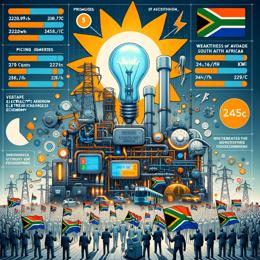Image created by AI
German Audit Reveals Operational Malaise at Eskom Amid Bailout Conditions
South Africa's state-owned electricity utility, Eskom, has become synonymous with operational inefficiencies and persistent power outages that have hamstrung the nation's economy and frustrated its citizens. A year ago, South African Treasury, wary of Eskom's checkered financial and operational history, set a condition for its R254-billion debt relief to the power utility: an independent review of its coal-powered fleet by German experts. This initiative's findings are poised to spur significant changes in Eskom, subject to the recommendations to be embraced by the government and Eskom’s management.
The commissioned report by the consortium featuring RWE Technology, STEAG, KWS Energy Knowledge, and Dornier Power and Heat has led to an unanticipated standstill in its release. An international intrigue comes into play as the implications of the report are twofold: operational at home and reputational abroad. The findings' anticipated details have sparked concern from both public and environmental watchdogs, eager to know about Eskom’s future in coal-powered energy generation.
The report reportedly diagnoses Eskom with a gamut of operational maladies. From procurement chaos, disempowered plant directors, centralization-induced inefficiencies, to woeful contract management, the issues run deep. These setbacks are compounded by the decrepit conditions of towns near the power stations, repelling the skilled labor force necessary for improvement. This, coupled with a culture hostile to change, raises concerns over South Africa’s ability to maintain, let alone improve the energy availability factor (EAF)—an indicator of the fleet's capability and health.
A critical lens is turned on Eskom's narrative about aging infrastructure. The EAF narrative, indicative of around 50% productivity, stands in stark contrast to U.S. counterparts that have improved their operations over time, despite sharing similar operational start dates. Concerns regarding staffing levels at Eskom are underscored by comparisons with international benchmarks, revealing a bloated workforce seemingly resistant to reform efforts. The organization's staffing and operational efficiency must be addressed to alleviate pressure on the national grid and facilitate a smoother transition to sustainable energy sources.
The report comes at a time when global environmental commitments are under scrutiny as well. South Africa had previously secured an $8.5-billion concessional loan at COP 28 in Edinburgh predicated on the intent to decommission coal plants. The unresolved state of the German report risks casting doubt on South Africa’s commitment to its international obligations and transition towards cleaner energy. The urgency for transparency and action has led to calls for the report's immediate release, which seemed imminent following the Finance Minister’s assurances during the Budget Speech.
As the report's impending recommendations look to feed into Eskom's strategic planning for the upcoming fiscal year, stakeholders remain hopeful yet cautiously watchful. While expectations are managed, the stakes are higher than ever: the report is not just a reflection on Eskom but a microcosm of South Africa’s energy policy and its reliability in the international community. It now remains to be seen if the veil will indeed be lifted and whether the insights will act as a catalyst for change or a mere historical document reflecting opportunities missed in the complex challenges facing Eskom.










